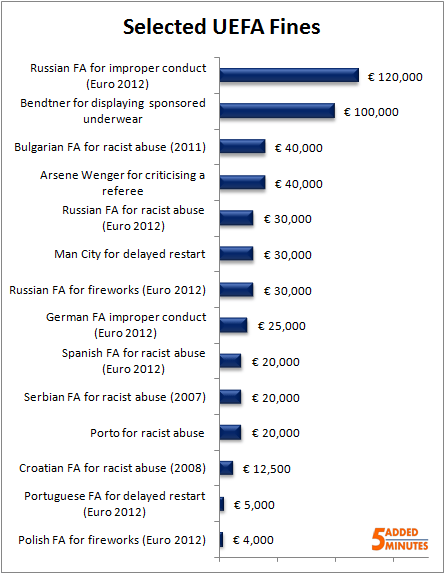Understanding UEFA’s incentives

Understanding UEFA’s incentives can help change decision-making (Image: Flickr/ahunziker)
Two of the criticisms UEFA has endured during the European Championship – particularly in England – is an apparent soft stance of racism, and a lack of care for fans.
The argument for the former was strengthened by the €100,000 fine handed to Niklas Bendtner for displaying underpants bearing the name of an Irish bookmaker. This is compared to fines three to four times smaller for racist abuse.

But why?
UEFA will earn $1.6 billion in commercial revenue from Euro 2012, a staggering amount. Sponsors paid good money to have their name attached to the tournament.
So if they are threatened by guerrilla marketing, they will either get very upset, or withdraw sponsorship altogether. Thus the incentive is there for UEFA to crack down on such stunts – why risk losing a stream of income?
Meanwhile, it appears sponsorship to major tournaments is largely unresponsive to factors such as the level of punishment for racist abuse.
Another criticism of the Euros in Ukraine and Poland was the sizable travel distances, which perhaps in part led to empty seats in stadiums that were reportedly sold-out. This, coupled with the suggestion that the tournament could be held in multiple countries from 2020, has led to suggestions that UEFA isn’t thinking or caring about the fans of the game.
Again, however, the actions undertaken by governing bodies are guided by incentives. The 2010 World Cup in South Africa generated $300 million in ticket sales. This was passed from FIFA on to the Organising Committee – instead focusing on the $3.7 billion it pulled in from TV, marketing, hospitality and licensing rights (read here from page 36).
Again, there is little incentive for UEFA to focus its energies on bringing fans into the stadia. In any case, it seems improbable that fans will stop turning up to games in sufficient numbers to hurt the organisation. Commercial revenues are king, and will continue to motivate the choices made by the governing bodies.
From a personal standpoint, this is not to condone UEFA’s decision making, rather provide some context. Instead of bemoaning these decisions, a more constructive approach would be to ask how best to realign incentives to combat racism, and bring fans to the stadium.

Thank you so much for utilizing some time in order to create
“Understanding UEFA’s incentives | 5 Added Minutes” ligersntigers .
Many thanks once again ,Guadalupe